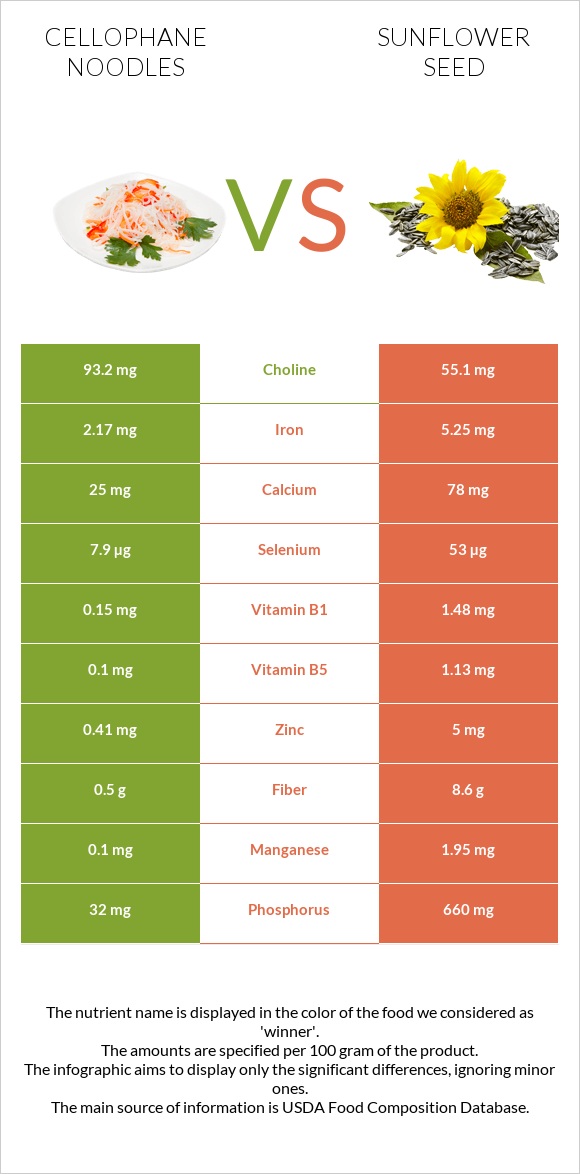Cellophane noodles vs. Sunflower seeds — In-Depth Nutrition Comparison
Compare
How are cellophane noodles and sunflower seeds different?
- Sunflower seeds are higher than cellophane noodles in vitamin E, copper, vitamin B1, vitamin B6, phosphorus, selenium, manganese, magnesium, folate, and vitamin B3.
- Sunflower seeds cover your daily need for vitamin E, 234% more than cellophane noodles.
- Cellophane noodles have a higher glycemic index (39) than sunflower seeds (20).
Noodles, chinese, cellophane or long rice (mung beans), dehydrated and Seeds, sunflower seed kernels, dried types were used in this article.
Infographic

Infographic link
Mineral Comparison
Mineral comparison score is based on the number of minerals by which one or the other food is richer. The "coverage" charts below show how much of the daily needs can be covered by 300 grams of the food.
| Contains more MagnesiumMagnesium | +10733.3% |
| Contains more CalciumCalcium | +212% |
| Contains more PotassiumPotassium | +6350% |
| Contains more IronIron | +141.9% |
| Contains more CopperCopper | +2122.2% |
| Contains more ZincZinc | +1119.5% |
| Contains more PhosphorusPhosphorus | +1962.5% |
| Contains more ManganeseManganese | +1850% |
| Contains more SeleniumSelenium | +570.9% |
Vitamin Comparison
Vitamin comparison score is based on the number of vitamins by which one or the other food is richer. The "coverage" charts below show how much of the daily needs can be covered by 300 grams of the food.
| Contains more Vitamin CVitamin C | +∞% |
| Contains more Vitamin AVitamin A | +∞% |
| Contains more Vitamin EVitamin E | +26953.8% |
| Contains more Vitamin B1Vitamin B1 | +886.7% |
| Contains more Vitamin B2Vitamin B2 | +∞% |
| Contains more Vitamin B3Vitamin B3 | +4067.5% |
| Contains more Vitamin B5Vitamin B5 | +1030% |
| Contains more Vitamin B6Vitamin B6 | +2590% |
| Contains more FolateFolate | +11250% |
All nutrients comparison - raw data values
| Nutrient |  |
 |
DV% diff. |
| Vitamin E | 0.13mg | 35.17mg | 234% |
| Copper | 0.081mg | 1.8mg | 191% |
| Polyunsaturated fat | 0.018g | 23.137g | 154% |
| Vitamin B1 | 0.15mg | 1.48mg | 111% |
| Vitamin B6 | 0.05mg | 1.345mg | 100% |
| Phosphorus | 32mg | 660mg | 90% |
| Selenium | 7.9µg | 53µg | 82% |
| Manganese | 0.1mg | 1.95mg | 80% |
| Fats | 0.06g | 51.46g | 79% |
| Magnesium | 3mg | 325mg | 77% |
| Folate | 2µg | 227µg | 56% |
| Vitamin B3 | 0.2mg | 8.335mg | 51% |
| Monounsaturated fat | 0.008g | 18.528g | 46% |
| Zinc | 0.41mg | 5mg | 42% |
| Protein | 0.16g | 20.78g | 41% |
| Iron | 2.17mg | 5.25mg | 39% |
| Fiber | 0.5g | 8.6g | 32% |
| Vitamin B2 | 0mg | 0.355mg | 27% |
| Carbs | 86.09g | 20g | 22% |
| Vitamin B5 | 0.1mg | 1.13mg | 21% |
| Saturated fat | 0.017g | 4.455g | 20% |
| Potassium | 10mg | 645mg | 19% |
| Calories | 351kcal | 584kcal | 12% |
| Choline | 93.2mg | 55.1mg | 7% |
| Calcium | 25mg | 78mg | 5% |
| Vitamin C | 0mg | 1.4mg | 2% |
| Net carbs | 85.59g | 11.4g | N/A |
| Sugar | 0g | 2.62g | N/A |
| Sodium | 10mg | 9mg | 0% |
| Vitamin A | 0µg | 3µg | 0% |
| Tryptophan | 0.002mg | 0.348mg | 0% |
| Threonine | 0.005mg | 0.928mg | 0% |
| Isoleucine | 0.007mg | 1.139mg | 0% |
| Leucine | 0.013mg | 1.659mg | 0% |
| Lysine | 0.011mg | 0.937mg | 0% |
| Methionine | 0.002mg | 0.494mg | 0% |
| Phenylalanine | 0.01mg | 1.169mg | 0% |
| Valine | 0.008mg | 1.315mg | 0% |
| Histidine | 0.005mg | 0.632mg | 0% |
| Omega-3 - EPA | 0g | 0.014g | N/A |
Macronutrient Comparison
Macronutrient breakdown side-by-side comparison
Protein:
0.16 g
Fats:
0.06 g
Carbs:
86.09 g
Water:
13.42 g
Other:
0.27 g
Protein:
20.78 g
Fats:
51.46 g
Carbs:
20 g
Water:
4.73 g
Other:
3.03 g
| Contains more CarbsCarbs | +330.5% |
| Contains more WaterWater | +183.7% |
| Contains more ProteinProtein | +12887.5% |
| Contains more FatsFats | +85666.7% |
| Contains more OtherOther | +1022.2% |
Fat Type Comparison
Fat type breakdown side-by-side comparison
Saturated fat:
Sat. Fat
0.017 g
Monounsaturated fat:
Mono. Fat
0.008 g
Polyunsaturated fat:
Poly. Fat
0.018 g
Saturated fat:
Sat. Fat
4.455 g
Monounsaturated fat:
Mono. Fat
18.528 g
Polyunsaturated fat:
Poly. Fat
23.137 g
| Contains less Sat. FatSaturated fat | -99.6% |
| Contains more Mono. FatMonounsaturated fat | +231500% |
| Contains more Poly. FatPolyunsaturated fat | +128438.9% |





